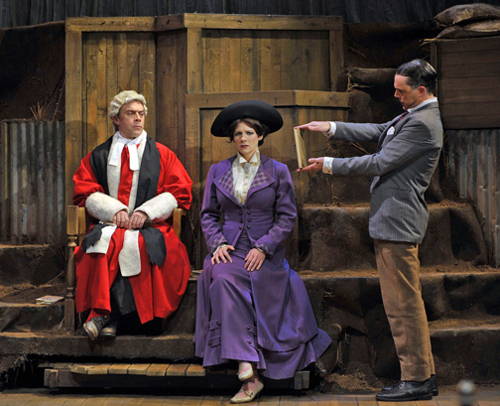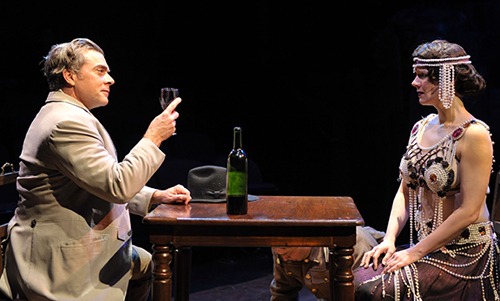
Shock in the courtroom: Kevin Clarke as the judge, Madeline H.D. Brown as Maud Allan, Mark Anderson Phillips as her accuser.
Maud Allan's name won't be found in any list of the casualties of World War I, but she surely must be ranked among its victims.
The battlefield where she attacked and fell was not some muddy no-man's land in France, but a staid courtroom in central London, Old Bailey. And the weapons arrayed against her were journalistic sensationalism, wartime hysteria, sexual ignorance, homophobia and self-serving lies. Despite valiant efforts, Allan was no match for her antagonists.
Her story is being told with force and compassion by Mark Jackson's Salomania, which is receiving its world premiere at Aurora Theatre in Berkeley.
Born in Canada in 1873 and raised in San Francisco, Allan trained as a pianist and then turned to dance in the first years of the 20th century. Her talent, voluptuous beauty and erotic interpretation of Oscar Wilde's Salome brought her fame in this country and Europe. It also brought condemnations, as well as a ban from the stages of England's No. 2 theatrical city, Manchester.
By the time of World War I, her career was fading and her appearances were few and poorly attended. She returned to England, where in 1918 she accepted an offer to play the title role in Salome in a private performance for well-to-do Britons. Considering wartime attitudes and the fact that the play had been banned for 25 years, even before Wilde's conviction for "gross indecency," the engagement carried some risks, but not the kind that Allan might have anticipated.
It provided a convenient target for a right-wing demagogue, Noel Pemberton-Billing, editor of a periodical called The Vigilante and a member of parliament. He was also a fierce critic of Britain's conduct of the war, insisting that some 47,000 of its leaders were selling out to Germany, in large part because they were victims of a huge blackmail scheme.
Why were so many well-placed Brits vulnerable to blackmail? Because they were homosexual, according to Billing and his cronies. To expose that grand conspiracy, he tried mightily to draw some politician into suing him for libel, thus provoking a trial that his journal could exploit. But they wouldn't bite.
So dancer Allan, a celebrity whom he accused in print of being a lesbian, sadist and German sympathizer, became his target of opportunity. Her pride wouldn't allow such charges to go unanswered. She sued and the rest is history, and terrific drama.
Employing a cast of seven -- six actors in multiple roles and Madeline H.D. Brown as Allan -- Jackson carries the tale from the trenches of France to Old Bailey to taverns, bedrooms and other venues with remarkable fluidity and force.

Clarke as the ghost of Oscar Wilde, Brown as Maud Allan, in costume as Salome
As in life, Allan is both the catalyst of the action and almost a sideshow to it. Although she delivers a few compelling moments on the witness stand and in flashbacks to her family background, including her brother's execution for two murders in San Francisco, she spends the greater part of the evening mutely circling the stage, dressed in Salome's beads and gauzy fabric and observing the interplay of others.
Among the more memorable of the multiple roles are Mark Anderson Phillips as the ferociously impassioned Billing, whose obsession with invisible conspiracies can find parallels in any era, and Anthony Nemirovsky as Billing's fellow schemer, an American whose fragile psyche falls apart under grueling cross-examination.
A tavern encounter between Marilee Talkington and Alex Moggridge provides perhaps the play's most poignant scene, he as a forlorn soldier on a short leave from the front and she as a war widow who offers him the temporary comfort of her body.
Kevin Clarke makes a huge leap of character in transformation from the stern judge who presides over the libel case to the weary ghost of Wilde, presumably in his depressed and alcoholic final years, and Liam Vincent adds a wonderfully smug turn as Lord Alfred Douglas, Wilde's lover of many years earlier, who appears as a witness for Billing's defense.
Nina Brown's spectacular set may be as important to the production's success as any of the performances, or Jackson's fine direction. Composed of crates, sandbags, a silently rolling platform and a few pieces of furniture, it metamorphoses from battlefield trench to courtroom to tavern and more with a minimum of physical shifting or delay. And Callie Floor's multilayered costumes facilitate changes of character with comparable swiftness and ease.
Salomania runs through July 29 at Aurora Theatre, 2081 Addison St., Berkeley. Tickets are $30 to $48, from 510-843-4822 or www.auroratheatre.org.
Photos by David Allen/davidallenstudio.com